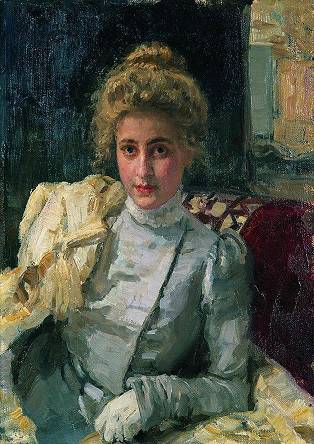Konstatin Nikolayevich Batyushkov (1787-1855) had a short writing life. He lapsed into depression and then insanity in 1821, and took no further
part in the cultural history of Russia. Brief though Batyushkov's contributions may have been, they were important. He was a modernizer, who purged Russian
verse of Church Slavonic and archaisms, but he was not a Romantic in the fashion of Zhukovsky, but much more rational, his verse being well turned in the 18th century manner.
Important for his own poetry, he also translated the French and Latin elegiac
poets, Tibullus and Parny, Tasso and Petrarch, consciously attempting to bring into Russian the sweetness and melody of Italian verse.

In the years preceding the onset of madness, Batyushkov produced lyrical epigrams with a great beauty of rhythm and diction, with a strange
beauty and haunting emotional intensity that are unique to Russian. There's little needing comment in this poem, except to note what the English hexameter can do if used properly.
К постарелой красавице
Тебе ль оплакивать утрату юных дней?
Ты в красоте не изменилась
И для любви моей
От времени ещё прелестнее явилась.
Твой друг не дорожит неопытной красой,
Незрелой в таинствах любовного искусства.
Без жизни взор её стыдливый и немой,
И робкий поцалуй без чувства.
Но ты, владычица любви,
Ты страсть вдохнёшь и в мёртвый камень;
И в осень дней твоих не погасает пламень,
Текущий с жизнию в крови.
The poem is written in iambic metre, in alternating hexameters and tetrameters. Feminine rhymes are shown
in upper case and feminine rhymes in lower case:
Тебе́ ль опла́кивать утра́ту ю́ных дней? 6a
Ты в красоте́ не измени́лась 4B
И для любви́ мое́й 3a
От вре́мени ещё преле́стнее яви́лась. 6B
Твой друг не дорожи́т нео́пытной красо́й, 6d
Незре́лой в та́инствах любо́вного иску́сства. 6E
Без жи́зни взор её стыдли́вый и немо́й, 6d
И ро́бкий поцалуй без чу́вства. 4E
Но ты, влады́чица любви́, 4f
Ты страсть вдохнёшь и в мёртвый ка́мень; 4G
И в о́сень дней твои́х не погаса́ет пламень, 6G
Теку́щий с жизнию в кро́ви. 4f
A TTS Audio Recording: Opening Stanzas
Ruverses has a version by
Alec Vagapov. I give his first stanza:
Should you deplore the loss of youthful days?
You haven’t changed, in all your splendour,
With time your charming grace
Has come to be more glamorous and tender.
It seems to me that we should respect the original line lengths
and rhyme pattern: they are part of the aesthetic experience.
To the Ageing Beauty
Why would you mourn the loss of those once youthful days
with you yourself not changed at all?
To me your loving's gaze
must yet appear, from year to year, more beautiful.
So do not think, my friend, that innocence would suit,
unskilled in love’s deep mysteries.
Without life's fire your eyes appear both shy and mute,
and timid the uncaring kiss.
You're mistress of me, and I know
you'd breathe fierce passion into stone,
so, through the autumn of your days, those flames should glow
in life's full flood of blood you own.
1. Mirsky, D.S., A History of Russian Literature (Knopf 1926 / Vintage Books 1958) 79-83.
2. Bristol, E., A History of Russian Poetry (O.U.P.) 100-2.
3. Pilshchikov, I.A and Fitt, T.H., Konstantin Batiushkov: Life and Work. Extended article in English.
Russian poem translations on this site: listing.